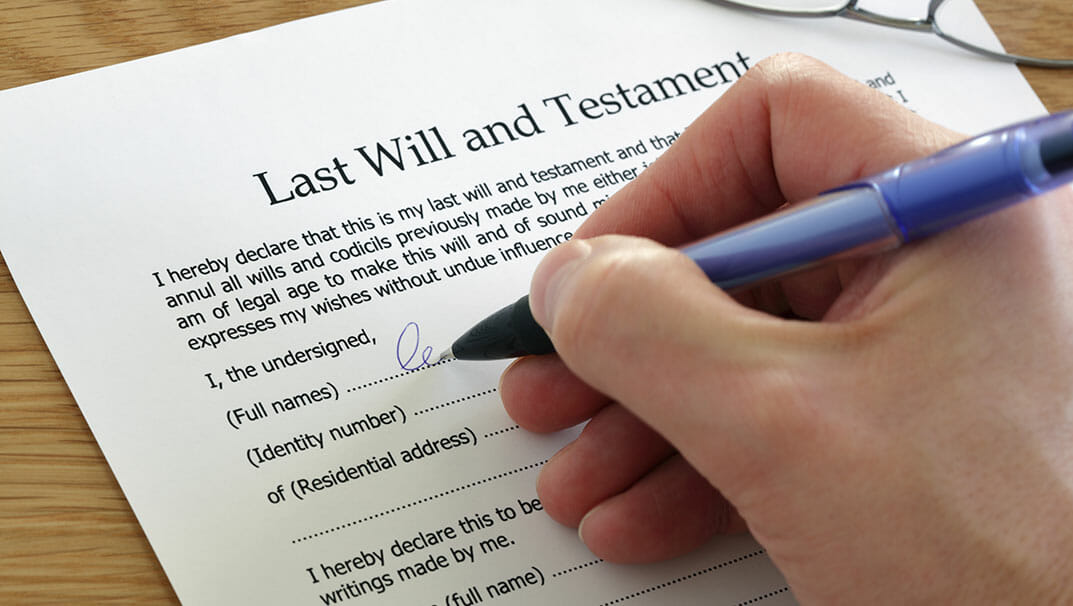Our probate attorney in Lexington, KY, can help with all your estate planning needs.
While no one enjoys thinking about death, many people put off making arrangements for what happens to their assets after their death. This is unfortunate, because working to plan your estate now, when you are able to do so, can ensure that your loved ones will be provided for after you are gone and that your estate and finances will be handled the way you want them to be.
Probate is a court-supervised legal process that may be required after someone dies, and probate law governs what happens with the deceased person’s property. Probate law is filled with terms that can be confusing. While you’ve likely heard of wills and beneficiaries, few people can correctly define testator, decedent, executor, or probate. Yet, all of those words will probably come into play during your lifetime at one point or another, and all of them are related to the process of what happens to the ownership of property when someone dies.
From the Latin for “something proved,” probate does refer to the judicial determination of whether a will is valid. However, it also encompasses the method by which an estate is administered and processed through the legal system – meaning that probate can occur even if there is no will.
Because probate law is complicated and making mistakes can keep your assets from being distributed the why you want them to be, it helps to have the guidance of a skilled Kentucky probate attorney when planning your estate. Perhaps you are uncertain of your rights and responsibilities, or you simply may not know where to begin.
The Lexington probate lawyers at Bunch & Brock are accomplished legal professionals with more than 35 years of legal experience and can help make things easier for you. Offering comprehensive counsel along with friendly, personal service, we have efficiently and effectively guided many people through the probate process. Call us today and put our experience to work for you.
Why Choose Our Probate Attorney?
There are many attorneys in Kentucky, but to protect your assets and ensure your loved ones are properly taken care, you should look for skilled, experienced professionals who have a deep understanding of estate and probate law. Here are some reasons why we feel you should choose Bunch & Brock:
- We are experienced. We celebrated our fortieth anniversary as a law firm providing professional, quality legal advice in Central Kentucky.
- You work directly with a lawyer. When you hire Bunch & Brock, you will have a lawyer handling your case—not a paralegal or legal assistant.
- We offer personalized service to clients. We provide the same experience and resources as many large firms, without giving up individual attention.
- We are affordable. We set up a fee schedule you can handle and can prevent you from making mistakes that can cost you more in the long run.
- We are local. The majority of our staff hails from Lexington and Central Kentucky, so we know the problems of the people in our region. The relationships we’ve forged with clients and the community are the cornerstones of our practice.
- We are accessible. You will work with an attorney who will listen to your concerns, answer your questions, and develop a strategy to meet your goals. Your attorney will return your phone calls, reply to your e-mails, and keep you informed of all developments in your case.
Our probate and estate planning attorneys provide comprehensive legal services for all your needs.
How Our Lexington Probate Attorney Helps
We know how important estate planning issues are, so when you retain Bunch & Brock, we will start working for you immediately. We will:
- Meet with you to discuss your specific estate situation and evaluate what your needs are, including wills, trusts, guardianship issues, creditor issues, estate taxes, and transferring assets
- Explaining the legal process after you or a relative has passed on
- Assisting you in writing a will or establishing a trust
- Determine best ways to protect your assets for your heirs and beneficiaries
- Assist you with contesting a will, including claims of undue influence, and represent you in probate, estate, and trust litigation, if necessary
- Help you with issues such as formal and summary probate administration, estate and trust administration, and appointment of personal representatives.
Our Lexington probate lawyers will create an estate planning strategy based on your individual circumstances.
Probate Lawyers Avoid Problems and Conflicts
Probate is a court-supervised Legal Process to settle an estate after someone’s death. A personal representative, called an executor, who is named in the will or appointed by the court if there is no will, is given the legal authority to gather and value assets, pay debts and taxes, and transfer assets to the people you wish to inherit them.
The purpose of probate is to prevent fraud after someone’s death. In Kentucky, no one can touch the estate until a judge determines that:
- The will is valid
- All the relevant people have been notified
- All the property has been identified and appraised
- Creditors and taxes have been paid.
At that point, property can be distributed and the estate is closed.
Legal Terms of Probate
Understanding the legal terms involved with probate helps simplify the process. Important terms include:
- Testator – the person who makes a will
- Beneficiary – anyone who receives property from the testator
- Executor – the person appointed to make sure the property is disposed of according to the testator’s wishes
- Decedent – the person who has died — who also may have been the testator at one time if a will was drafted.
If there is a will, the probate court examines it to determine if it was legally created. In order to be valid, wills in Kentucky are required to be in writing, signed and dated by the testator, and signed by witnesses. Wills are examined to see if they list all the testator’s assets, if the assets are properly valued, and if the assets can be passed on in the way the testator wanted. For example, a testator cannot disinherit his or her spouse unless there is a prenuptial agreement stipulating otherwise.
Assets That Can Avoid Probate
It is important to understand that there are assets that can be passed on without going through probate. Your taxable estate includes all the assets in which you have an interest at the time of death, but only those assets that are held individually have to go through probate. Assets that are jointly owned with a right of survivorship pass to the second owner when the first owner dies, so they are not usually subject to probate.
Other assets that can be passed on without going through probate include:
- Tenancy by the Entirety or Community Property with Right of Survivorship – These are forms of property ownership that function like joint tenancy, in that the survivor owns the entire property at the death of the other tenant, but these forms of ownership are only available to married couples.
- Policies and Accounts with Beneficiary Designation, such as bank accounts, brokerage accounts, retirement accounts, and life insurance policies have named beneficiaries entitled to the assets in the account or the proceeds of the policy.
- Assets in a Living Trust – Living Trusts are created mostly to avoid probate. The person setting up the trust, called the trustor, designates a person, called a trustee, to hold property for another person, called a beneficiary. If you are setting up a living trust, you can make yourself the trustee and keep full control over all property held in the trust while you are alive. You also designate a successor trustee, often a spouse or a child, to handle and distribute property after you die.
Cash, personal property, real estate, assets held as tenants in common, and named beneficiary assets that do not name anyone are generally subject to probate. The assets that make up an estate have to be distributed in a specific order.
For example, any debts or taxes owed by the decedent will be paid first. Creditors that have a valid claim are typically paid in the following order: estate administration costs, family allowances, funeral expenses, taxes, and debt.
When all of the creditors are satisfied, whatever is left over is distributed to the beneficiaries named in the will.
If you did not have a will or it is determined that only part of the estate is covered by a valid will, probate applies Kentucky law to establish who gets what and legally transfers title to those people. This may not be the way you wish your assets to be distributed, so it is best to have your estate well planned in advance.
Probate can be quite helpful even where a decedent did not leave behind any property to transfer, or if he or she had creditor problems or was the subject of a potential lawsuit, because it allows for all of the decedent’s debts to be finally settled. That can be very beneficial to a decedent’s survivors.
Probate Attorneys Explain Small Estate Limits
If a Kentucky resident died with an estate that falls under the “small estates” limit in Kentucky, there is a simplified probate procedure, often called a “summary probate.”
Probate courts are state courts, so the processes they follow vary from one state to another. In Kentucky, there is a simplified probate process for small estates that makes it easier for survivors to transfer the decedent’s property. The process is available where the will leaves no personal property, there is a surviving spouse and the value of property subject to probate is $15,000 or less, or if there is no surviving spouse and someone else has paid at least $15,000 in preferred claims. To determine if an estate qualifies for this shortcut or it must be subject to regular probate, it’s in your best interest to consult with a Kentucky estate planning attorney to review the options.
Call Our Probate Attorneys in Lexington, KY, for Help
People often try to avoid probate because it can be time-consuming and expensive. There are pros and cons to trying to limit the amount of a probate estate by maximizing joint tenancies, lifetime gifts, payable-on-death accounts and living trusts. The average time to complete probate is approximately six to eight months, and the delay in asset transfer can be a hardship for the decedent’s beneficiaries. Probate cases can also take years if the estate is very large, the estate continues to earn large amounts of income after the decedent has died, or if someone challenges the will. Costs in probate proceedings usually equal between two and five percent of the value of the assets that go through the process.
Dealing with a loved one’s estate can be a difficult time for the family. The experienced Kentucky probate lawyers at Bunch & Brock can help. We understand that each probate estate is unique, and we have worked hard to protect the best interests of hundreds of clients faced with the situation you are in now. We are committed to providing each of our clients with a high level of personal service, and we will walk you through each of the steps that must be taken.
Don’t put off dealing with planning your estate until it’s too late.
Call Bunch & Brock to schedule an initial consultation today at 859-254-5522.
Client Testimonial
“Matt Bunch did an exceptional job for me with a very difficult, messy probate case. His response time was always quick. He was proactive in handling the case. I would recommend him to anyone looking for a great attorney. – Lee Ann Snelling” (Google Review)

Attorney Tom Bunch II
Tom is a well-rounded attorney who can bring his experience to bear upon circumstances as presented by a client. Tom practices in Debtor and Creditor Legal Issues arising in Bankruptcy (with extensive experience in Chapter 7, 11, 12 and 13 cases, aka Personal Bankruptcy and Corporate Bankruptcy) and non-bankruptcy matters (loan workouts and foreclosure defense, debt relief and debt settlement). [ attorney bio ]














